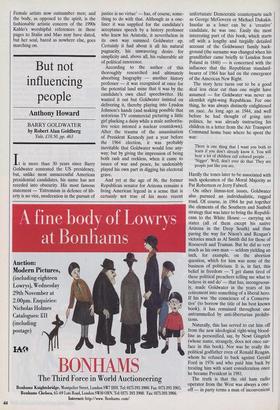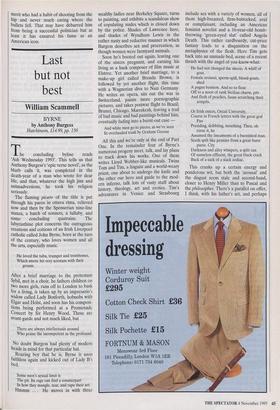But not influencing people
Anthony Howard
BARRY GOLDWATER by Robert Alan Goldberg Yale, £18.50, pp. 463 It is more than 30 years since Barry Goldwater contested the US presidency, but, unlike most unsuccessful American presidential candidates, his name has not receded into obscurity. His most famous statement — 'Extremism in defence of lib- erty is no vice, moderation in the pursuit of justice is no virtue' — has, of course, some- thing to do with that. Although as a one- liner it was supplied for the candidate's acceptance speech by a history professor who knew his Aristotle, it nevertheless in its own way summed Goldwater up. Certainly it had about it all his natural pugnacity, his unwavering desire for simplicity and, above all, his vulnerable air of political innocence.
According to the author of this thoroughly researched and ultimately absorbing biography — another history professor — it was recognised at once for the potential land mine that it was by the candidate's own chief speechwriter. He wanted it out but Goldwater insisted on delivering it, thereby playing into Lyndon Johnson's hands (and making possible that notorious TV commercial picturing a little girl plucking a daisy while a male authorita- tive voice intoned a nuclear countdown). After the trauma of the assassination of President Kennedy just a year before the 1964 election, it was probably inevitable that Goldwater would lose any- way; but by giving the impression of being both rash and reckless, when it came to issues of war and peace, he undeniably played his own part in digging his electoral grave.
And yet at the age of 86, the former Republican senator for Arizona remains a living American legend in a sense that is certainly not true of his more recent unfortunate Democratic counterparts such as George McGovern or Michael Dukakis. Insofar as a loser can be a 'creative' candidate, he was one. Easily the most interesting part of this book, which starts off with a lengthy and turgidly detailed account of the Goldwasser family back- ground (the surname was changed when his grandfather came briefly to London from Poland in 1848) — is concerned with the influence that the Republican standard- bearer of 1964 has had on the emergence of the American New Right.
The story here turns out to be a good deal less clear cut than one might have assumed — for Goldwater was never an identikit right-wing Republican. For one thing, he was always distinctly enlightened on race. As long ago as 1944, and well before he had thought of going into politics, he was already instructing his children in a letter from the Air Transport Command home base where he spent the war: There is one thing that I want you both to learn if you don't already know it. You will hear a lot of children call colored people . `Nigger'. Well, don't ever do that. They are people just like you are.
Hardly the tones later to be associated with such spokesmen of the Moral Majority as Pat Robertson or Jerry Falwell.
On other litmus-test issues, Goldwater also pursued an individualistic, rugged road. Of course, in 1964 he put together the elements of the Southern and Sunbelt strategy that was later to bring the Republi- cans to the White House — carrying six states (all of them except his native Arizona in the Deep South) and thus paving the way for Nixon's and Reagan's victories much as Al Smith did for those of Roosevelt and Truman. But he did so very much as his own man — seldom yielding an inch, for example, on the abortion question, which for him was none of the business of politicians. It is, in fact, this belief in freedom — 'I get damn tired of these political preachers telling me what to believe in and do' — that has, incongruous- ly, made Goldwater in the years of his retirement into something of a liberal hero. If his was 'the conscience of a Conserva- tive' (to borrow the title of his best known book), it has remained throughout one untrammelled by anti-libertarian prohibi- tions.
Naturally, this has served to cut him off from the new ideological right-wing blood- line as personified, say, by Newt Gingrich (whose name, strangely, does not once sur- face in this book). Nor was he really the political godfather even of Ronald Reagan, whom he refused to back against Gerald Ford in 1976 and who paid him back by treating him with scant consideration once he became President in 1981.
The truth is that the old ham radio operator from the West was always a one- off — in party terms a man of inconvenient merit who had a habit of shooting from the hip and never much caring where the bullets fell. That may have debarred him from being a successful politician but at least it has ensured his fame as an American icon.











































































 Previous page
Previous page